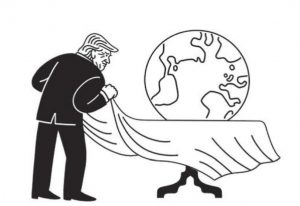Signposts of a changing world order?

Are there any signposts along the way when a world order changes?
Yes. Consider two examples from just the past eight months.
On June 29, member states of a United Nations migration agency (IOM) rejected US President Donald Trump’s nominee for director general, repudiating 67 years of American control of the organisation.
In November, India’s candidate for judgeship at the International Court of Justice (ICJ) in The Hague won through over Britain’s nominee. It was the first time a country that wasn’t a permanent member of the UN Security Council defeated a candidate fielded by a P5 member. This had much to do with changing diplomatic equations and the balance of global power. As Indian diplomats said at the time, it’s right for Britain to now “align its interests with those of developing countries and give them a fair share of representation in international governance.”
The UN migration agency’s choice of a new leader is a somewhat different matter. It seems not to be about changing US power per se (though there is some of that too with respect to changing perceptions of America’s moral principles).
In the main though, the IOM vote seems to be about the cynical confidence with which the Trump administration despatched a nominee who has publicly made known his hardline views on Muslims. The nominee, Ken Isaacs, was also seen to be fairly comfortable with Mr Trump’s notion that walls are better than bridging efforts (economic projects etc) when dealing with the flow of people from rich countries to poor.
Unsurprisingly, a body such as the International Organisation for Migration (IOM), was dubious about Mr Isaacs’ fitness for the job. IOM was founded as the Provisional Intergovernmental Committee for the Movement of Migrants from Europe. Its name stated its purpose. It was meant to manage the movement of people after World War II.
After several name changes, the IOM as it is now known, has an equally weighty portfolio. At present, it has to manage the movement of peoples from war zones such as Syria as well as asylum-seekers and economic migrants from sub-Saharan Africa and parts of South Asia.
So, is the rejection of Mr Isaacs really a signpost along the way of a changing world order? It was, at the very least, a recognition of the disdain that informed the American nomination. That IOM member-states were willing to reject the candidate of one of its largest single donor-countries was brave. It may have funding consequences.
The blowback may come from Mr Trump himself, in a tweet. He may withdraw the US from the IOM, thereby cutting off American funding.
That too will be a signpost of a changing world order.

